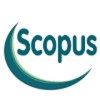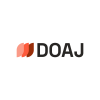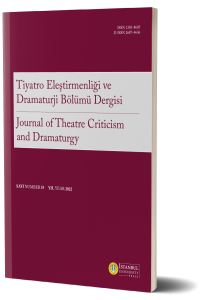Research Article
Aim & Scope
Journal of Theatre Criticism and Dramaturgy - Tiyatro Eleştirmenliği ve Dramaturji Bölümü Dergisi is a peer-reviewed, open-access, scientific journal published twice a year in June and December devoted to study of theatre and performance.
The Journal features social and historical studies, theoretical inquiries that analyze dramatic texts and production. The languages of publication are English, German and Turkish.
Author Guidelines
MANUSCRIPT ORGANIZATION AND FORMAT
1. All correspondence will be sent to the first-named author unless otherwise specified.
2. Manuscpript is to be submitted online via https://dergipark.org.tr/tr/pub/teddergi
3. The submmitted manuscript must be accompanied by a title page including detailed information about the article and a cover letter (optional). Manuscripts should be prepared in Microsoft Word 2003 and upper versions. In addition, Copyright Agreement Form that has to be signed by all authors must be submitted. (see the Submission Checklist).
4. The abstracts (in the language of article and in English) must be of 100-150 words each.
5. Five keywords (5 in the language of article and 5 in English) must be given underneath the abstracts.
6. Extended abstract of 600-700 words is required for the manuscripts in Turkish and German.
7. Quotations in the manuscript must be italicised and the citations in text must be indicated as footnote in 10 points.
8. The text of the main document must be in Times New Roman font and in 12 points.
9. Line spacing in the manuscript must be 1.5.
10. The paragraphs must be indented 1.5.
11. The title must be written with capital letters (14 points, bold).
12. A title page including author information must be submitted together with the manuscript. The title page is to include fully descriptive title of the manuscript and, affiliation, title, e-mail address, postal address, phone, fax number of the author(s) and ORCIDs of all authors (see The Submission Checklist).
Reference Style and Format
Journal of Theatre Criticism and Dramaturgy - Tiyatro Eleştirmenliği ve Dramaturji Bölümü Dergisi has adopted “Chicago Manual of Style (CMOS)”. Detailed information is available on https://www.chicagomanualofstyle.org/tools_citationguide/citation-guide-1.html
Authors are responsible for the accuracy of references. All references should be cited in text. Below given examples should be considered in citing the references.
Examples:
FN: First note, SN: Subsequent note, B: Bibliography
Book
FN Kerem Karaboğa, Oyunculuk Sanatında Yöntem ve Paradoks (İstanbul: Habitus Kitap, 2012), 73.
SN Karaboğa, Oyunculuk Sanatında Yöntem ve Paradoks, 44.
B Karaboğa, Kerem. Oyunculuk Sanatında Yöntem ve Paradoks. İstanbul: Habitus Kitap, 2012.
FN Toby Cole and Helen Krich Chinoy, Directors on Directing: A Source Book of the Modern Theatre (Chicago: Echo Point Books and Media, 2013), 37.
SN Cole and Chinoy, Directors on Directing: A Source Book of the Modern Theatre, 65.
B Cole, Toby and Chinoy, Helen Krich. Directors on Directing: A Source Book of the Modern Theatre Chicago: Echo Point Books and Media, 2013.
Translated Book
FN Joachim Latacz, Antik Yunan Tragedyaları, trans. Yılmaz Onay (İstanbul: Mitos Boyut Yayınları, 2012), 24.
SN Latacz, Antik Yunan Tragedyaları, 32.
B Latacz, Joachim, Antik Yunan Tragedyaları, Translated by Yılmaz Onay. İstanbul: Mitos Boyut Yayınları, 2012.
Chapter of an Edited Book
FN Oğuz Arıcı, “Poetika’da Zaman ve Mekan Düşüncesi”, in Tiyatroda Zaman/Mekan, Ed. Kerem Karaboğa (İstanbul: Habitus Kitap, 2018), 20.
SN Arıcı, “Poetika’da Zaman ve Mekan Düşüncesi”, 24.
B Arıcı, Oğuz. “Poetika’da Zaman ve Mekan Düşüncesi.” In Tiyatroda Zaman/Mekan. Edited by Kerem Karaboğa, 11-34. İstanbul: Habitus Kitap, 2018.
Preface, Introduction, Etc. of a Book
FN Özdemir Nutku, foreword to Othello by William Shakespeare (İstanbul: Remzi Kitabevi, 2006), XVII.
SN Nutku, foreword to Othello, XVI.
B Nutku, Özdemir. Foreword to Othello by William Shakespeare, I-XXI. İstanbul: Remzi Kitabevi, 2006.
E-Book
FN Fakiye Özsoysal, Tiyatro Metinlerinde Alımlama ve Metin Stratejileri (İstanbul: Altkitap, 2002), https://www.altkitap.net/tiyatro-metinlerinde-alimlama-ve-metin-stratejileri/.
SN Özsoysal, Tiyatro Metinlerinde Alımlama ve Metin Stratejileri, 39.
B Özsoysal, Fakiye. Tiyatro Metinlerinde Alımlama ve Metin Stratejileri. İstanbul: Altkitap, 2002. https://www.altkitap.net/tiyatro-metinlerinde-alimlama-ve-metin-stratejileri/.
FN Brooke Borel, The Chicago Guide to Fact-Checking (Chicago: University of Chicago Press, 2016), 92, ProQuest Ebrary.
SN Borel, Fact-Checking, 104–5.
B Borel, Brooke. The Chicago Guide to Fact-Checking. Chicago: University of Chicago Press, 2016. ProQuest Ebrary.
For books consulted online, cite the URL or the name of the database. If no page numbers are available, cite a section, loc number (kindle) or chapter title.
Journal article
FN Nilgün Firidinoğlu, “Faruk Nafiz Çamlıbel’in “Kahraman Destanı” ve Yazınsal Metnin Üretim Sürecinde İdeolojik Zorunluluğun Rolü”, Tiyatro Eleştirmenliği ve Dramaturji Bölüm Dergisi 17 (2010), 87.
SN Firidinoğlu, “Faruk Nafiz Çamlıbel’in “Kahraman Destanı,” 89-90.
B Firidinoğlu, Nilgün. “Faruk Nafiz Çamlıbel’in “Kahraman Destanı” ve Yazınsal Metnin Üretim Sürecinde İdeolojik Zorunluluğun Rolü”, Tiyatro Eleştirmenliği ve Dramaturji Bölüm Dergisi 17 (2010), 85-97.
Translated Journal Article
FN Charlotte Rea, “Kadın Tiyatro Grupları”, çev. Ayşan Sönmez, Mimesis Tiyatro/ Çeviri- Araştırma Dergisi 12 (2006), 22.
SN Rea, “Kadın Tiyatro Grupları”, 25.
B Rea, Charlotte. “Kadın Tiyatro Grupları”, Çeviren Ayşan Sönmez. Mimesis Tiyatro/ Çeviri- Araştırma Dergisi 12 (2006), 21-37.
Online Journal Article
FN Ali Artun, “Bauhaus: Modernleşmenin Tasarımı” Skop Dergi 14 (2019): 12. 27 Mart 2019.
SN Artun, “Bauhaus: Modernleşmenin Tasarımı”, 17.
B Artun, Ali. “Bauhaus: Modernleşmenin Tasarımı” Skop Dergi 14 (2019): 9-21. 27 Mart 2019.
For articles consulted online, cite the URL or the name of the database. If available, specify the DOI (Digital Object Identifier) number.
Thesis or Dissertation
FN Yavuz Pekman, “Çağdaş Türk Tiyatrosunda Geleneksellik”, (PhD diss., İstanbul Üniversitesi, 2001), 28.
SN Pekman, “Çağdaş Türk Tiyatrosunda Geleneksellik”, 76.
B Pekman, Yavuz. “Çağdaş Türk Tiyatrosunda Geleneksellik.” PhD diss., İstanbul Üniversitesi, 2001.
Encyclopaedia Entry
FN Aziz Çalışlar, “Belgesel Oyun,” Tiyatro Ansiklopedisi, (Ankara: T.C. Kültür Bakanlığı Yayınları, 1995), 70.
SN Çalışlar, “Belgesel Oyun,” 70.
B Çalışlar, Aziz. “Belgesel Oyun,” Tiyatro Ansiklopedisi: 70-72. Ankara: T.C. Kültür Bakanlığı Yayınları, 1995.
Book Review
FN Rıdvan Turhan, “Mali Krizler Tarihi: Cinnet, Panik ve Çöküş”, İstanbul Üniversitesi Sosyoloji Dergisi, 16 (2008), 241.
SN Turhan, “Mali Krizler Tarihi: Cinnet, Panik ve Çöküş,” 243.
B Turhan, Rıdvan. “Mali Krizler Tarihi: Cinnet, Panik ve Çöküş”, İstanbul Üniversitesi Sosyoloji Dergisi, 16 (2008): 239-244.
Website Content
FN Carl Tollef Solberg ve Espen Gamlund, “How Should We Evaluate Deaths?,” Practical Ethics, erişim 03 Temmuz 2019, http://blog.practicalethics.ox.ac.uk/2019/05/guest-post-how-should-we-evaluate-deaths/
SN “How Should We Evaluate Deaths?”
B Solberg, Carl Tollef ve Gamlund, Espen. “How Should We Evaluate Deaths?” Practical Ethics. Erişim 03 Temmuz 2019, http://blog.practicalethics.ox.ac.uk/2019/05/guest-post-how-should-we-evaluate-deaths/
News or Magazine Article
FN Takiyettin Mengüşoğlu, “Eğitimde Tarihi Çevre ve İnsan,” Cumhuriyet, 14 Aralık 1971, 2.
SN Mengüşoğlu, “Eğitimde Tarihi Çevre ve İnsan,” 2.
B Mengüşoğlu, Takiyettin. “Eğitimde Tarihi Çevre ve İnsan.” Cumhuriyet, 14 Aralık 1971.
Online News or Magazine Article
FN “What Consent? Hungary, Poland & Czech Republic Deny Sealing Migrant Deal with Merkel”, Russia Today, 30.06.2018, erişim 30.06.2018). https://www.rt.com/news/431382-hungary-poland-czech-migrants/
SN “What Consent?”
B “What Consent? Hungary, Poland & Czech Republic Deny Sealing Migrant Deal with Merkel”, Russia Today, 30.06.2018, erişim 30.06.2018). https://www.rt.com/news/431382-hungary-poland-czech-migrants/
SUBMISSION CHECKLIST
Ensure that the following items are present:
Confirm that the category of the manuscript is indicated.
Confirm that “the paper is not under consideration for publication in another journal”.
Confirm that final language control is done.
Confirm that journal policies detailed in Information for Authors have been reviewed.
Confirm that the references cited in the text and listed in the references section are in line with
journals’s reference system based on Chicago Manual of Style.
Copyright Agreement Form (will only be sent after the article has been accepted for publication)
Permission for non-published material
Title page
The category of the manuscript
The title of the manuscript both in the language of the manuscript and in English
All authors’ names and affiliations (institution, faculty/department, city, country),
e-mail addresses
Corresponding author’s email address, full postal address, telephone and fax number
ORCIDs of all authors.
Acknowledgements, grant supports, conflicts of interest should be indicated
Main Manuscript Document
Important: Please avoid mentioning the the author (s) names in the manuscript.
The title of the manuscript both in the language of the manuscript and in English
Abstracts (100-150 words) both in the language of manuscript and in English
Key words: 5 words both in the language of manuscript and in English
Extended abstract (600-700 words) in English (for articles in German and Turkish)
Manuscript body text
References
All tables, illustrations (figures) (including title)
CONTACT INFO
Editor-in-chief : Nilgün Firidinoğlu, Oğuz ARICI
E-mail : jtcd@istanbul.edu.tr
Phone : +90 (212) 455 57 00
Address : Istanbul University, Faculty of Letters,
Department of Theatre Criticism and Dramaturgy
Balabanağa Mah. Ordu Cad. No: 6
34134 Laleli, Fatih, Istanbul, Turkey
Ethical Principles and Publication Policy
Standards and Principles of Publication Ethics
The journal is committed to upholding the highest standards of publication ethics and pays regard to Principles of Transparency and Best Practice in Scholarly Publishing published by the Committee on Publication Ethics (COPE), the Directory of Open Access Journals (DOAJ), the Open Access Scholarly Publishers Association (OASPA), and the World Association of Medical Editors (WAME) on https://publicationethics.org/resources/guidelines-new/principles-transparency-and-best-practice-scholarly-publishing
The subjects covered in the manuscripts submitted to the Journal for publication must be in accordance with the aim and scope of the Journal. Only those manuscripts approved by every individual author and that were not published before in or sent to another journal, are accepted for evaluation.
Changing the name of an author (omission, addition or order) in papers submitted to the Journal requires written permission of all declared authors.
Plagiarism, duplication, fraud authorship/denied authorship, research/data fabrication, salami slicing/salami publication, breaching of copyrights, prevailing conflict of interest are unethical behaviors. All manuscripts not in accordance with the accepted ethical standards will be removed from the publication. This also contains any possible malpractice discovered after the publication.
Plagiarism
Submitted manuscripts that pass preliminary control are scanned for plagiarism using iThenticate software. If plagiarism/self-plagiarism will be found authors will be informed. Editors may resubmit manuscript for similarity check at any peer-review or production stage if required. High similarity scores may lead to rejection of a manuscript before and even after acceptance. Depending on the type of article and the percentage of similarity score taken from each article, the overall similarity score is generally expected to be less than 15 or 20%.
Double Blind Peer-Review
After plagiarism check, the eligible ones are evaluated by the editors-in-chief for their originality, methodology, the importance of the subject covered and compliance with the journal scope. The editor provides a fair double-blind peer review of the submitted articles and hands over the papers matching the formal rules to at least two national/international referees for evaluation and gives green light for publication upon modification by the authors in accordance with the referees’ claims.
Research Ethics
Journal of Theatre Criticism and Dramaturgy adheres to the highest standards in research ethics and follows the principles of international research ethics as defined below. The authors are responsible for the compliance of the manuscripts with the ethical rules.
- Principles of integrity, quality and ransparency should be sustained in designing the research, reviewing the design and conducting the research.
- The research team and participants should be fully informed about the aim, methods, possible uses and requirements of the research and risks of participation in research.
- The confidentiality of the information provided by the research participants and the confidentiality of the respondents should be ensured. - The research should be designed to protect the autonomy and dignity of the participants.
- Research participants should participate in the research voluntarily, not under any coercion.
- Any possible harm to participants must be avoided. The research should be planned in such a way that the participants are not at risk.
- The independence of research must be clear; and any conflict of interest or must be disclosed.
- In experimental studies with human subjects, written informed consent of the participants who decide to participate in the research must be obtained. In the case of children and those under wardship or with confirmed insanity, legal custodian’s assent must be obtained.
- If the study is to be carried out in any institution or organization, approval must be obtained from this institution or organization.
- In studies with human subject, it must be noted in the method’s section of the manuscript that the informed consent of the participants and ethics committee approval from the institution where the study has been conducted have been obtained.
Author's Responsibilities
It is authors’ responsibility to ensure that the article is in accordance with scientific and ethical standards and rules. Authors must ensure that submitted work is original. They must certify that the manuscript has not previously been published elsewhere or is not currently being considered for publication elsewhere, in any language. Applicable copyright laws and conventions must be followed. Copyright material (e.g. tables, figures or extensive quotations) must be reproduced only with appropriate permission and acknowledgement. Any work or words of other authors, contributors, or sources must be appropriately credited and referenced.
All the authors of a submitted manuscript must have direct scientific and academic contribution to the manuscript. The author(s) of the original research articles is defined as a person who is significantly involved in “conceptualization and design of the study”, “collecting the data”, “analyzing the data”, “writing the manuscript”, “reviewing the manuscript with a critical perspective” and “planning/conducting the study of the manuscript and/or revising it”. Fund raising, data collection or supervision of the research are not sufficient for being accepted as an author. The author(s) must meet all these criteria described above. The order of names in the author list of an article must be a co-decision and it must be indicated in the Copyright Agreement Form The individuals who do not meet the authorship criteria but contributed to the study must take place in the acknowledgement section. Individuals providing technical support, assisting writing, providing a general support, providing material or financial support are examples to be indicated in acknowledgement section.
All authors must disclose all issues concerning financial relationship, conflict of interest, and competing interest that may potentially influence the results of the research or scientific judgment. When an author discovers a significant error or inaccuracy in his/her own published paper, it is the author’s obligation to promptly cooperate with the Editor-in-Chief to provide retractions or corrections of mistakes.
Responsibility for the Editor and Reviewers
Editor-in-Chief evaluates manuscripts for their scientific content without regard to ethnic origin, gender, sexual orientation, citizenship, religious belief or political philosophy of the authors. He/She provides a fair double-blind peer review of the submitted articles for publication and ensures that all the information related to submitted manuscripts is kept as confidential before publishing.
Editor-in-Chief is responsible for the contents and overall quality of the publication. He/She must publish errata pages or make corrections when needed.
Editor-in-Chief does not allow any conflicts of interest between the authors, editors and reviewers. Only he has the full authority to assign a reviewer and is responsible for final decision for publication of the manuscripts in the Journal.
Reviewers must have no conflict of interest with respect to the research, the authors and/or the research funders. Their judgments must be objective.
Reviewers must ensure that all the information related to submitted manuscripts is kept as confidential and must report to the editor if they are aware of copyright infringement and plagiarism on the author’s side.
A reviewer who feels unqualified to review the topic of a manuscript or knows that its prompt review will be impossible should notify the editor and excuse himself from the review process.
The editor informs the reviewers that the manuscripts are confidential information and that this is a privileged interaction. The reviewers and editorial board cannot discuss the manuscripts with other persons. The anonymity of the referees must be ensured. In particular situations, the editor may share the review of one reviewer with other reviewers to clarify a particular point.
Price Policy
All expenses of the journal are covered by the Istanbul University. Processing and publication are free of charge with the journal. There is no article processing charges or submission fees for any submitted or accepted articles.
Indexes
Journal Boards
Editorial Management

















